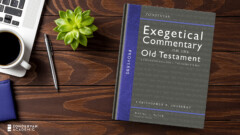“Move over, politics. Americans are looking for personal, ecstatic experiences of God, and, according to our poll, they don’t much care what the neighbors are doing.” So says Newsweek in the first line of the feature article in the latest issue of the magazine. I think it would be safe to say that many professed Christians are seeking the same. “‘Young people got tired of hearing that once upon a time people experienced God directly,’ says historian Martin E. Marty of the University of Chicago. ‘They want it to happen for themselves. They don’t want to hear that Joan of Arc had a vision. They want to have a vision.’” Many forms of religion are only too happy to provide that type of experience. The article goes on to point to Catholicism, Buddhism, Islam, Kabbalah, Wicca and Pentecostalism. Each of these is able to provide the type of ecstasy that Americans are seeking after.
On one hand it is exciting that Americans are seeking after a personal experience with the Divine. That is an experience that Christianity can and does provide. Christianity is the first faith that offered a personal experience with God – to know Him in a deep, intimate personal way, and at the same time to be known by Him. It may not be exactly what people expect, but as long-time believers we are prone to forget just how powerful an experience it is to be indwelt by the Spirit of God.
What Christianity cannot truly provide is the type of ecstatic experiences many people desire. Christianity is a religion where we are never encouraged or expected to take leave of our senses. The ecstasy that is found in the techniques of Eastern meditation or in the wild dancing and yelling of pagan religions is completely foreign to the Bible. And yet many Christians try to blend religious experiences. The article mentions Ron Cox, a New Yorker who left his Southern Baptist Church and tried and rejected Hinduism and Buddhism before experiencing a Pentecostal worship service. “he was trans—fixed by the sight of worshipers so moved by the Holy Spirit that they were jumping, shouting and falling to the floor in a faint. Soon he, too, was experiencing the ecstasy of the Holy Spirit. Once, it seemed to lift him right out of his body: ‘I felt the Spirit come upon me, and it was an overwhelming presence. It was bliss. I thought only 10 or 15 minutes had passed, but three hours had gone by. And I remember just shouting, ‘Hallelujah, hallelujah, hallelujah!’ ‘” This type of experience may be produced in the name of God and with fleeting reference to the Bible, but this is not what God desires of us.
In our day it is increasingly important that we know what God expects and allows in worship. He has not kept silent when it comes to his expectations of our worship. The Bible is filled with godly wisdom that instructs us how we can worship Him in spirit and truth. Let’s not lose sight of this as our culture becomes increasingly desirous of experience that we cannot provide if we are to remain faithful to our Guide.
The article concludes with the type of line we have come to expect in a postmodern society. “So let us say together: Hallelujah! Praise the Lord! Sh’ma Yisrael. Allahu Akbar. Om. And store up the light against the darkness.” After all, Americans agree that all (or most) roads ultimately lead to the same destination. And they are right: most do. Thankfully, God has seen fit to show us the one road, the narrow road, that runs straight to Him.
You can read Newsweek’s article here.










